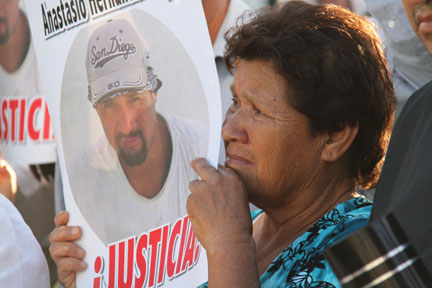Anastasio Hernández; A year without justice

A year has passed since that night on May 28th 2010, when about twenty federal agents beat and tasered an undocumented immigrant, Anastasio Hernández, as he was being deported to Tijuana.
The beating and tasing left him brain dead; he was declared dead at a San Diego Hospital a few days later.
On the anniversary of this violent incident, family members, activists and the border community held a small vigil asking for justice and for the federal officials responsible for this death to be brought to trial.
“You can see there where many, many agents who had a clear understanding of what they were doing” said Anastasio`s cousin, Veronica Hernandez at the protest, “the government is covering up their actions and refuses to tell us what happened.”
The federal government has yet to inform the family of the investigation and has not released the names of the agents involved. None of them has been put on leave or removed from their job.
What makes the family angry is the existence of a video that was released on You Tube, and many witnesses that have come forward to tell their account, yet, the authorities have not named suspects.
“Authorities told us it is legal for them to act that way because it’s their job” said Luz Rojas, Anastasio´s mother, “but they should not have permission to commit murder.
“All I want is for the law to apply to them. I know that will not bring my son back to life but at least I will know they will stop abusing their power and killing people” said Rojas.
According to activist Pedro Rios, from American Friends Committee, since Anastasio´s death, there have been at least seven other incidents in the border region that have ended with an immigrants death.
“None of the documented cases have ended with someone being held responsible” he added.
Such is the case of Guillermo Rodríguez Martínez, an immigrant shot to death by the Border Patrol in 2005. The case was quickly dismissed because the officer claimed Rodriguez was an immigrant smuggler and was about to hit the officer a rock.
Forensic evidence showed Rodriguez was shot in the back.
“We don’t want this to become a routine in our border communities” said Rios.
But in fact, this kind of questionable behavior has become more and more common, not only amongst federal agents but also by local San Diego police officers.
It was at a recent soccer game with Mexico´s national team, when a Hispanic man was beaten at Qualcomm stadium.
As in the case of Anastasio, somebody filmed the incident and quickly disseminated it on social media networks and then in news casts across Mexico and the US creating an outpour of critics against the officer‘s actions.
“We had brief contact with the family and as far as we know, they where filing a civil suit against the police department, we took a step back to allow the case to proceed” said Rios.
As the local director of American Friends Service Committee, Rios is deeply worried about police abuse against migrants and citizens alike. He claims many incidents have happened recently, including one where a man was arrested for no reason by the police. He was never charged with a crime yet he is still in jail, facing deportation.
“We have to remember cases like the death of Sergio Adrián, the Ciudad Juárez teen who was gunned down just days after Anastasio´s death, and I’m sure there are other cases that have occurred when nobody was there to witness, that we will never know occurred” he said.
“Thousands of millions of dollars are being spent to reinforce the border, yet little is done to guarantee the rights of border communities and to oversee the officers actions in the area”.
Since Operation Gatekeeper started back in 1994, there have been at least 6000 deaths at the border, most of them undocumented immigrants who died in their intent to make it into US territory, and each year, DHS deports around 400,000 undocumented immigrants to Mexico.
The fear is that any of them can be treated like Anastasio.
“Alan Bersin just came to San Diego to talk about another border program, yet he has refused to meet with Anastasio´s family and answer their questions about his death” said Rios.
“Under the current system there is no oversight, no transparency about how federal agents act at the border, they shut down cameras to commit their crimes, they lie and contribute to a climate of fear amongst border community members” said Rios with a trembling voice, “yet, we are here to tell them we are no longer afraid and no longer be silent in the face of injustice”.








